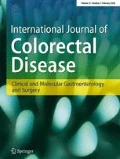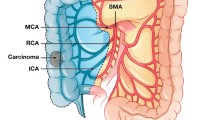Abstract
Purpose
Complete mesocolic excision (CME) with central vascular ligation (CVL) has been proposed for treatment of colon cancers based on the same principles as total mesorectal excision. Impressive outcomes have been reported, however, direct comparisons with the classic procedure are lacking.
Methods
Forty-five consecutive patients operated on in the last 5 years with CME and CVL right hemicolectomy entered the study. Fifty-eight right-sided colon cancer patients operated in the previous 5 years with classic approach constituted the control group. Intra- and postoperative course assessed the safety of the procedure. Primary end-points for oncological adequacy were recurrence and survival rate.
Results
All operations were successful with no increase in postoperative complications (p = 0.85). Number of harvested nodes and length of vascular ligation were shown to be significantly better in the CME group (p < 0.01). A higher number of tumor deposits were harvested thus allowing chemotherapy in newly upstaged patients. Locoregional recurrences were never experienced in CME patients (p = 0.03). The risk of cancer-related death was reduced by over one half in all CME patients, and even by three quarters in node-positive tumors. The classic operation was significantly associated with poor outcome (p < 0.01).
Conclusion
This study shows that CME with CVL is a safe and effective surgical approach for right colon cancer, thus confirming the previously reported oncological adequacy. The procedure was shown to significantly decrease local recurrences and to improve the survival rate, particularly in node-positive patients. Urgent diffusion of this technique is warranted.


Similar content being viewed by others
References
Siegel R, Naishadham D, Jemal A (2012) Cancer statistics, 2012. CA Cancer J Clin 62:10–29
AIRTUM Working Group (2011) Survival of cancer patients in Italy. Epidemiol Prev 35(suppl 3):1–200
Ostenfeld EB, Erichsen R, Iversen LH, Gandrup P, Nørgaard M, Jacobsen J (2011) Survival of patients with colon and rectal cancer in central and northern Denmark, 1998–2009. Clin Epidemiol 3(Suppl 1):27–34
Quirke P, Steele R, Monson J, Grieve R, Khanna S, Couture J, O’Callaghan C, Myint AS, Bessell E, Thompson LC, Parmar M, Stephens RJ, Sebag-Montefiore D, MRC CR07/NCIC- CTG CO16 Trial Investigators; NCRI Colorectal Cancer Study Group (2009) Effect of the plane of surgery achieved on local recurrence in patients with operable rectal cancer: a prospective study using data from the MRC CR07 and NCIC-CTG CO16 randomised clinical trial. Lancet 373:821–828
Heald RJ, Husband EM, Ryall RDH (1982) The mesorectum in rectal cancer surgery—the clue to pelvic recurrence? Br J Surg 69:613–616
West NP, Hohenberger W, Weber K, Perrakis A, Finan PJ, Quirke P (2010) Complete mesocolic excision with central vascular ligation produces an oncologically superior specimen compared with standard surgery for carcinoma of the colon. J Clin Oncol 28:272–278
Kong M, Hong SE, Choi WS, Kim SY, Choi J (2012) Preoperative concurrent chemoradiotherapy for locally advanced rectal cancer: treatment outcomes and analysis of prognostic factors. Cancer Res Treat 44:104–112
Hohenberger W, Reingruber B, Merkel S (2003) Surgery for colon cancer. Scand J Surg 92:45–52
Bokey EL, Chapuis PH, Dent OF, Mander BJ, Bissett IP, Newland RC (2003) Surgical technique and survival in patients having a curative resection for colon cancer. Dis Colon Rectum 46:860–866
West NP, Morris EJA, Rotimi O, Cairns A, Finan PJ, Quirke P (2008) Pathology grading of colon cancer surgical resection and its association with survival: a retrospective observational study. Lancet Oncol 9:857–865
Hohenberger W, Weber K, Matzel K, Papadopoulos T, Merkel S (2009) Standardized surgery for colonic cancer: complete mesocolic excision and central ligation—technical notes and outcome. Colorectal Dis 11:354–364
West NP, Kobayashi H, Takahashi K, Perrakis A, Weber K, Hohenberger W, Sugihara K, Quirke P (2012) Understanding optimal colonic cancer surgery: comparison of Japanese D3 resection and European complete mesocolic excision with central vascular ligation. J Clin Oncol 30:1763–1769
Gouvas N, Pechlivanides G, Zervakis N, Kafousi M, Xynos E (2012) Complete mesocolic excision in colon cancer surgery: a comparison between open and laparoscopic approach. Colorectal Dis 14:1357–1364
Hogan AM, Winter DC (2009) Complete mesocolic excision (CME): a ‘novel’ concept? J Surg Oncol 100:182–183
Bonnet S, Berger A, Hentati N, Abid B, Chevallier JM, Wind P, Delmas V, Douard R (2012) High tie versus low tie vascular ligation of the inferior mesenteric artery in colorectal cancer surgery: impact on the gain in colon length and implications on the feasibility of anastomoses. Dis Colon Rectum 55:515–521
Eiholm S, Ovesen H (2010) Total mesocolic excision versus traditional resection in right-sided colon cancer—method and increased lymph node harvest. Dan Med Bull 57:A4224
Spasojevic M, Stimec BV, Gronvold LB, Nesgaard JM, Edwin B, Ignjatovic D (2011) The anatomical and surgical consequences of right colectomy for cancer. Dis Colon Rectum 54:1503–1509
Madoff RD (2012) Defining quality in colon surgery. J Clin Oncol 30:1738–1740
Hohenberger W, Merkel S, Weber K (2007) Lymphadenektomie bei Tumoren des unteren Gastrointestinaltrakts. Chirurg 78:217–225
Bertelsen CA, Bols B, Ingeholm P, Jansen E, Neuenschwander AU, Vilandt J (2011) Can the quality of colonic surgery be improved by standardization of surgical technique with complete mesocolic excision? Colorectal Dis 13:1123–1129
Alberts SR, Sargent DJ, Nair S, Mahoney MR, Mooney M, Thibodeau SN, Smyrk TC, Sinicrope FA, Chan E, Gill S, Kahlenberger MS, Shields AF, Quesenberry JT, Webb TA, Farr GH Jr, Pockaj BA, Grothey A, Goldberg RM (2012) Effect of oxaliplatin, fluorouracil, and leucovorin with or without cetuximab on survival among patients with resected stage III colon cancer: a randomized trial. JAMA 4:1383–1393
American Joint Committee on Cancer (2009) AJCC cancer staging manual, 7th edn. Springer, New York
Cannistra SA (2009) Phase II trial in journal of clinical oncology. J Clin Oncol 27:3073–3076
Cirocchi R, Trastulli S, Farinella E, Desiderio J, Vettoretto N, Parisi A, Boselli C, Noya G (2012) High tie versus low tie of the inferior mesenteric artery in colorectal cancer: a RCT is needed. Surg Oncol 21:111–123
Le Voyer TE, Sigurdson ER, Hanlon AL, Mayer RJ, Macdonald JS, Catalano PJ, Haller DG (2003) Colon cancer survival is associated with increasing number of lymph nodes analyzed: a secondary survey of intergroup trial INT-0089. J Clin Oncol 21:2912–2919
Galizia G, Orditura M, Ferraraccio F, Castellano P, Pinto M, Zamboli A, Cecere S, De Vita F, Pignatelli C, Lieto E (2009) The lymph node ratio is a powerful prognostic factor of node-positive colon cancers undergoing potentially curative surgery. World J Surg 33:2704–2713
Lykke J, Roikjaer O, Jess P, The Danish Colorectal Cancer Group (2013) The relation between lymph node status and survival in stage I–III colon cancer: results from a prospective nationwide cohort study. Colorectal Dis 15:559–565
Higuchi T, Sugihara K (2010) Complete mesocolic excision (CME) with central vascular ligation (CVL) as standardised surgical technique for colonic cancer: a Japanese multicentre study. Dis Colon Rectum 53:646, abstr P176
Conflict of interest
The authors declare that they have no conflict of interest.
Author information
Authors and Affiliations
Corresponding author
Additional information
Gennaro Galizia and Eva Lieto contributed equally to this work.
Electronic supplementary material
Below is the link to the electronic supplementary material.
ESM 1
(DOC 88 kb)
Rights and permissions
About this article
Cite this article
Galizia, G., Lieto, E., De Vita, F. et al. Is complete mesocolic excision with central vascular ligation safe and effective in the surgical treatment of right-sided colon cancers? A prospective study. Int J Colorectal Dis 29, 89–97 (2014). https://doi.org/10.1007/s00384-013-1766-x
Accepted:
Published:
Issue Date:
DOI: https://doi.org/10.1007/s00384-013-1766-x




